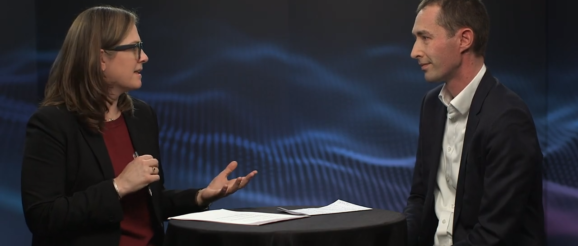NetApp ONTAP AI Drives Innovation And Intelligence | NetApp Blog

Zeroing In on the Reality of Artificial Intelligence
How is artificial intelligence affecting our lives today, and how will it evolve? Emily Miller, NetApp VP of Brand & Influence, recently sat down with Tim Ensor, Commercial Director for Artificial Intelligence at Cambridge Consultants, to discuss how his company is helping to shape our future through AI.
Evolving Intelligence
Although it’s been a buzzword for decades, artificial intelligence (AI) is finally coming into its own. In the past, neural networks, expert systems, and fuzzy logic were hot topics in engineering, but they were never widely adopted. Now, with massive compute power, widespread data availability, and expert analytics teams, AI is finally taking off. However, the amount of data required for some deep learning techniques can still be a roadblock for applications. And there has also been some controversy about whether and how AI should be regulated. Ensor believes that “if we don’t take the public and the lawmakers with us, things may get tricky.”
Cambridge Consultants, sometimes called “the firm behind the future,” uses NetApp® ONTAP® AI to stay at the forefront of this revolution, helping accelerate innovation. “I think at the speed at which things are moving, we’re writing the story as we go. At the moment, it feels like we’re moving at the speed of maths, or math, depending on which side of the Atlantic you come from,” quipped Ensor. He compared the potential of AI to change businesses and everyday life over the next decade to the retail shopping shift of the last 10 years. “That’s the direction we are heading in: autonomous vehicles, high levels of intelligence, and piecing together intelligence into high-level systems.”
Seeing Clearly
AI can learn to make content and create data by using a deep learning technique called generative adversarial networks (GANs). Ensor described practical applications of GANs in medical diagnostics, an area in which AI has historically had difficulty with proficiency. “We’ve been looking at techniques to use GANs to augment, to create new images of the treatment condition, for example, to allow you to have a more balanced dataset, and we’re seeing that by using those techniques, the performance of your classifier goes up—through the roof. You can make huge leaps forward.”
Beyond mimicking data, adversarial AI methods can repair damaged data. Imagine a pair of images, one high- es and the other low res (damaged). Cambridge Consultants trains AI by comparing the two versions and collecting data. It then uses the information to create a new, repaired image. “Suddenly, you can zoom in, the way you used to see in the sci-fi movies, because you’re creating the data along the way,” Ensor said. “You can make something that’s imperfect… a little more perfect.”
Disruptive… in a Good Way
AI capabilities are helping companies disrupt their markets and provide new experiences. Cambridge Consultants has worked with Iridium to provide satellite telephony, collaborated with Novartis to develop user-friendly smart inhalers, and helped create the fitness wearable segment with the Nike Fuel Band.
AI has the potential to transform countless industries, including medicine, where it can improve both patients’ access to their medications and doctors’ ability to provide care. To illustrate the potential of AI for disruptive—and positive—impact on healthcare, Miller told the story of a friend whose son has diabetes. “She’s able to look on her phone and know how he’s being monitored, and when he’s getting medication. They’re able to manage his diabetes so much more effectively and proactively, and that’s had a huge impact on his life,” she said.
Ensor agreed. “It’s incredible to see the technology develop, but also because you’re starting to bring consumer electronics into that space, which is amazing in itself. And it means that you’re taking away some of the stigma of a condition that you’re managing as well.”
Helping Machines Cope in the “Real” World
Cambridge Consultants’ internal AI research group, known as the Digital Greenhouse, focuses on machine perception and human-machine collaboration. Its research helps autonomous machines cope in the real world. “As a human, we understand what it means to look through a rain-splattered windshield, but autonomous vehicles find that really hard,” explained Ensor. “So now we’re talking about using this technology to help those machines and vehicles actually cope with real-world conditions, which is exciting.” This research could also have a tremendous impact on the medical imaging field. Current devices often display fuzzy or distorted images, and creating a clearer picture can help patients receive more accurate diagnoses and better outcomes.
What’s Next
AI continues to evolve, and firms like Cambridge Consultants are using NetApp ONTAP AI to power research that will change our lives. From using deep machine learning to mimic and create data, to making the most of human-machine collaborations, AI development is further along than ever before. As Ensor said, “I’m excited; this time, I think it’s going to take off.”
Learn more about NetApp ONTAP AI powered by NVIDIA.
